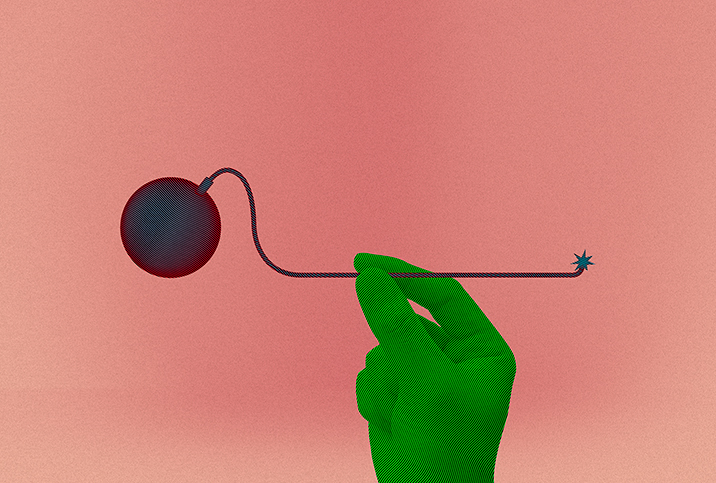What Should I Do if My Partner Orgasms too Quickly?

The medical term is premature ejaculation and, yes, having an orgasm too quickly can be a very difficult thing for couples to talk about.
Of course, it works both ways.
If your partner has a penis and regularly finds themselves reaching a climax before you're close, it can bring that particular sexual encounter to a rather sudden end. And it can be 30 minutes or longer before the action can resume.
If your partner has a vagina and needs a break following an orgasm before going again, that can also bring sexual activity screeching to an abrupt halt.
Needless to say, orgasms are great. And the sex prior to the orgasm is likely great, too. However, sudden and unplanned early orgasms are not the best conversation starters.
So how can you discuss this issue without hurting your partner's feelings or making it sound as though you don't enjoy sex with them? And, just as important, is there anything you can do about it together to ensure the sex is enjoyable for both of you in the future?
The buildup
Let's kick off with a refresher on what happens to our bodies as we approach and have an orgasm.
"For people assigned female at birth, who have vaginas, the vagina and clitoris swell. They become engorged with blood as the individual becomes aroused through whatever stimuli a particular person finds arousing. The orgasm itself is produced by muscle contractions," said Wendi Dumbroff, M.A., a licensed professional counselor from Madison, New Jersey.
"Similarly, for people assigned male at birth, who have penises, the penis becomes engorged with blood through the process of arousal and becomes erect, with muscle contractions occurring at the peak of arousal and providing the experience of orgasm," she added. "Although most people with a penis will ejaculate with orgasm, some may not, for example, if the prostate has been removed."
What exactly is premature ejaculation?
Ceara V. Corry, M.S.W., M.P.A., also known as Cee the Sex Lady, a sex educator and therapist at the Naked Truth in North Carolina, said people first need to know the difference between an orgasm and ejaculation.
"While the two terms are often used interchangeably, they describe two separate processes that may or may not occur together," she explained. "Orgasm is commonly defined as the peak of sexual pleasure or arousal. Ejaculation refers to expelling fluid from the urethra of the penis or Skene's gland of the vulva. It's possible to experience a 'dry' orgasm, or one that does not coincide with ejaculation, and to experience ejaculation without orgasm, such as during nocturnal emissions, commonly known as wet dreams."
Where does premature ejaculation come in then?
"Premature ejaculation is clinically defined by ejaculation that occurs within one minute after beginning vaginal intercourse," Corry continued. "This medical definition is rooted in the heteronormative assumption that sex always involves intercourse between a man with a penis and a woman with a vagina. However, people of all gender identities, sexual orientations and genitalia characteristics can be concerned about the speed at which they ejaculate or orgasm.
"Experiences with, or even the thought of, premature ejaculation can cause significant distress in an individual and/or tension in their relationship," Corry noted. "Partners may wonder what they're doing wrong, feel as if their needs aren't being met or be embarrassed, [while] those who have premature ejaculation may develop lower self-esteem or sexual performance anxiety."
Dumbroff pointed out that there is often a gender element at play, too.
"Most of the men I have worked with who experience premature ejaculation are very troubled by it," she said. "They feel embarrassed, and it causes them distress around intimacy. I have seen different responses from women. Many are quite understanding and willing to work together with their partner to extend the time before ejaculation, regardless of whether they care or not about lengthier penetration time. Sometimes there are women who are frustrated because they enjoy having a long experience of penetration, especially if they enjoy climaxing vaginally."
Let's talk about the refractory period
Often, it's not the premature ejaculation itself that creates a strained sexual environment between a couple, but rather it's the wait before both parties are, well, ready to party again. This time is known as the refractory period, or the resolution stage.
"[This is] the period of time following ejaculation during which one cannot ejaculate again, and it can last between a few minutes to several hours, depending on the person," Corry explained. "As a physiological response, refractory periods involve physical components, such as an inability to gain an erection, and physiological factors, such as a decreased interest or desire for sex."
And, yes, there's a gender element here, although, as with so many other areas of research, there's a significant lack of knowledge concerning how the refractory period plays out for women.
"Most research about refractory periods focuses on people with penises, leaving vast knowledge gaps on this process in people with vaginas," Corry said. "However, it is believed that all people can experience the physiological factors at a minimum."
A lot of the negative feelings around premature ejaculation followed by a (relatively) long refractory period come from toxic societal messaging.
"Heteronormative narratives about sex posit that in order to 'count,' sexual encounters must conclude after penile ejaculation," she said. "The connection between these narratives and the biological need for rest after sexual activity can lead to disappointment if one partner is not sufficiently satisfied after the encounter."
In other words, if you identify as a woman and your male partner has ejaculated before you were even close, it brings the sex to an abrupt end.
"Over time, repeated experiences like this can lead to frustration or even resentment in the relationship," Corry explained.
Dumbroff noted that the refractory period can be a reminder of the passing of time, too.
"The refractory period can definitely lengthen as men/people with penises age," she added. "Sometimes it can be a marker of growing older, and there is grief around the loss of the way their younger body functioned. This can be true for both men and women as they notice all the changes in their bodies that come with aging."
Most importantly, though, the refractory period doesn't have to be a bad thing.
"Perhaps penetrative activities or those that require a high level of arousal may not be suitable for this time, but couples can engage in many other intimacy-building and pleasurable activities, such as cuddling, sharing highlights of the sexual encounter or massages," Corry said.
"Expanding the menu of intimate options can help because there are many ways couples can experience closeness and intimacy with or without the outcome being orgasm," Dumbroff agreed.
What can I do if my partner orgasms too soon?
First things first. You should not blame yourself or your partner for premature orgasms. Not that sex is ever a "blame game," but feelings of blame may arise nevertheless, and they're important to acknowledge, talk about and quickly put in your rear-view mirror.
"If your partner experiences premature ejaculation, you may feel shocked, disappointed or concerned about your sexual future," Corry said. "It's important to note that this is not your fault and that your partner is not purposely sabotaging your sex life. Patience, compassion and open communication will go a long way in having a fulfilling sexual relationship."
Dumbroff recommended that a kind, direct approach is best when bringing up sensitive issues, especially those that may require a response while you're having sex.
"The way we express things to another person, sexual or not, has a big impact on how the conversation goes," Dumbroff explained. "For example, something like 'You always orgasm so quickly I don't even enjoy sex' is most likely going to shame your partner and not lead to a productive discussion. Something gentler, like 'It seems to bother you that you orgasm so quickly. I'd be willing to explore some fun ways to work on that. What do you think?' might be more useful."
If you're not sure if your partner's premature ejaculation bothers them, Corry has a suggested script, too: Ask questions like "I noticed you tend to ejaculate quickly when we do (insert sexual activity when premature ejaculation tends to occur). How do you feel about that? Are you having a satisfying sexual experience when this happens?"
Despite the toxic societal messages we've all been force-fed, the great thing about sex is it's unique for every couple.
"Partners have the power to define what 'counts' as sex and what is considered a satisfying experience," Corry said. "If partners determine that orgasm for each partner and ejaculation is essential, perhaps consider taking turns focusing stimulation on one partner at a time, starting with the one least likely to ejaculate or orgasm quickly.
"Another option is when noticing that ejaculation is imminent, try switching to a less stimulating but still enjoyable activity, such as deep kissing or body massages, until the urge to ejaculate has passed," she added. "You can repeat this as many times as you would like, even after ejaculation has eventually occurred."
She emphasized that the most important strategy is to keep the communication going and maintain a compassionate approach to sex and the role that each of you plays in each sexual encounter.
"Remember that sex is what you and your partner want it to be," she explained. "There is no 'one size fits all.'"


















